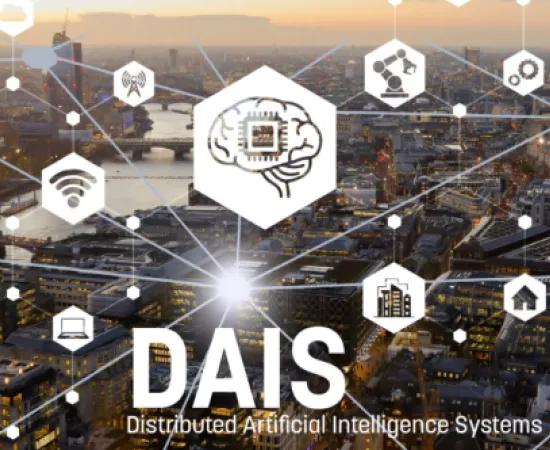
DAIS | AI at the edge with Distributed Artificial Intelligent Systems
The pan-European project DAIS is bringing faster, more secure and energy-efficient data processing solutions through the development of edge AI software and hardware components.
Context
With the revolutionary change brought on by the Internet of Things (IoT) and the rapid increase of data from more and more ubiquitous connected devices, system vulnerabilities have been brought to the forefront. How can we collect and process the ever-growing amount of data, while also addressing the challenges regarding privacy, speed and energy efficiency? And how can Europe take the lead in a domain which is already predominated by America and Asia? These are some of the questions which the project Distributed Artificial Intelligent Systems (DAIS) is looking to answer.
The new paradigm of edge computing provides innovative solutions by bringing resources closer to the user, keeps sensitive and private data on the edge device, and provides low latency, energy efficiency, and scalability compared to cloud services, while also reducing the network bandwidth. At the same time, there is an increasing need to use artificial intelligence (AI) at the edge. Bringing together these innovations and subsequently migrating the AI functions from the cloud to the edge will serve as the next step in the evolution where the DAIS project will be a major contributor. In the future edge intelligence scenario, advanced AI and machine learning algorithms will be optimized to run on the edge and will be capable of processing video frames, natural speech information and unstructured data generated by cameras or microphones, and other sensors without uploading data to the cloud and waiting for the response.
Objective
DAIS has the ambitious objective to develop intelligent and secure edge solutions for industrial applications for the European industry throughout the whole supply chain. More precisely, DAIS aims at:
- Providing intelligent processing of data and communication locally at the edge to enable real-time and safety-critical industrial applications.
- Developing industrial-grade secure, safe and reliable HW and SW solutions that can cope with cyberattacks and difficult network conditions.
- Providing AI techniques on the edge that match with diverse computing powers contrary to relatively consistent computing power on the cloud.
- Distributing and dividing the complex AI operations between the cloud and edge, with edge undertaking early intelligent data processing, hence reducing the bandwidth of data being transmitted to the cloud; and building the infrastructure (including hardware and software) to provide for this in Europe.
- Providing data sharing and collaborating solutions on the edge to handle the temporal-spatial diversity of edge data.
- Developing solutions for IoT, i.e., mostly wireless devices with energy and processing constraints, for heterogeneous and hostile/harsh environments.
- Providing re-usable solutions across industrial domains.
- Using a methodological approach with the integral supply chain, from academia to system designers and integrators, to component providers, applications and services developers & providers and end-users.
Approach
In order to achieve and validate the stated impact, the DAIS consortium has defined so-called supply chains (SC). Each supply chain addresses a specific DAIS objective, and its results are used as input to other supply chains and project activities. DAIS defines two types of supply chains:
- The enabling technology supply chains (SC 1-5) develop the fundamental core software and hardware technology elements (such as components, systems and architectures) required by the application supply chains.
- The application supply chains (SC 6-8) apply and validate the results achieved in the enabling technology supply chains. The advancements achieved during the DAIS project will be showcased by dedicated demonstrators of these application supply chains.
Within DAIS, Sirris expects to acquire new knowledge and know-how related to the optimal exploitation of the computation potential of IoT networks and specifically edge devices, in the form of:
- Distributed machine learning techniques and approaches that are adapted to the constraints imposed by these types of networks and devices
- Privacy-preserving and security measures that can be used to protect on-device and shared data
For this purpose, Sirris will cooperate with Sentigrate, a Leuven-based SME with a focus on sensor data processing and modelling.
Project partners
Belgium:
This project is a collaboration between the software engineering programme of Sirris and the EluciDATA Lab.
- Sirris
- Sentigrate
All partners:
https://dais-project.eu/all-partners/
Internal link
https://www.sirris.be/secure-distributed-intelligence-constrained-environments-are-you-yet-seduced


